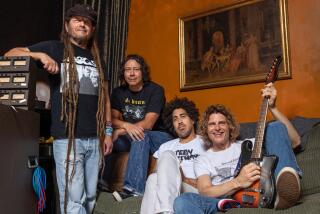My so-called life: Jim Ruland on writing memoirs for other people
- Share via
By the time the fourth round of shots and beers arrives at our table at the karaoke bar in Dutch Harbor, Alaska, the crab fishermen are no longer paying attention to me. They don’t notice that I’m not drinking or that I’m typing into my phone, even though there’s no cell service. They’re too busy getting ready to sing songs by AC/DC, Bob Seger and Hank Williams Jr. to an audience of lonely fisherman. I might as well be invisible, which is just the way I like it.
I’d traveled to Alaska’s Aleutian Islands to spend time with Scott Campbell Jr., captain of the Seabrooke, famed for his role on Discovery Channel’s “Deadliest Catch.” The trip was the culmination of a series of interviews that would eventually lead to the 2014 book “Giving the Finger: Risking It All to Fish the World’s Deadliest Sea.” Campbell’s face, boat and name are on the cover — as is my name, the co-author’s, in much smaller letters.
Although I felt like a ghost that night in Dutch Harbor, I’m not a ghostwriter. The difference between a co-author and a ghostwriter is that the former can talk about the project, whereas the latter is usually not at liberty to do so. That’s where the mystique comes in: Ghostwriter sounds cool — co-author, not so much.
The contracts remind us that the subject is the “author,” the storyteller, the person the reader will identify as the “I” of the story. I am the “writer,” the individual who shapes the story. It’s up to the writer to deliver the book; the subject has lived the experiences and tells the tale.
Co-writing books is like being a really good karaoke singer: You have to capture the essence of your subject and stay true to the voice of the person on the page.
Like Campbell, I knew my way around boats; I’m a veteran of the Navy. In fact, it was the book proposal I’d written about my own experiences as a boatswain’s mate onboard a diesel-powered submarine hunter in the late ‘80s that got me in the door. But while my knowledge of nautical nomenclature was a big help, it wasn’t what sealed the deal. Campbell is the son of a fisherman. His entry to the strange and dangerous world of crab fishing on the Bering Sea was both easier and more difficult because of his father’s legacy and influence. As the son of a naval officer who enlisted in the Navy straight out of high school, this resonated with me. This was a story I could tell.
To use our karaoke analogy, Campbell wrote and recorded the songs; I reproduced them in a (hopefully) compelling and entertaining fashion. This is a particularly apt metaphor for my latest project, collaborating with Keith Morris, the vocalist of the Circle Jerks and a founding member of the seminal hard core band Black Flag, on his forthcoming memoir “My Damage.”
Fifteen-year-old me couldn’t believe it when I got the job. I’d grown up listening to punk rock and had seen Morris perform with the Circle Jerks a handful of times, including at KROQ’s Inland Invasion with the Sex Pistols in 2002. I was living in Manhattan Beach then, skating the same stretch of the Strand that Morris wrote about in his lyrics. For most of my adult life, I’ve written for L.A. punk rock zines Flipside and Razorcake.
I might have thought that someone known for songs that rarely last more than two minutes would be as economical in his use of language offstage as he is on it. That wasn’t the case. Morris and I worked together for well over a year, recording dozens of interviews and compiling transcripts in excess of 170,000 words.
Perhaps Morris wouldn’t have been as open if we hadn’t logged all those hours in his apartment in Los Feliz. He has a lot to say not only about his 40 years as a musician but also about his struggles with alcohol, drugs and diabetes. As a sober punk rock enthusiast, I’ve found it hard to reconcile the “live fast, die young” ethos with the decidedly unglamorous lifestyle of a writer, partner and parent. Morris’ memoir is not a self-help book, but it helped me — his insight has been an inspiration.
I’m proud of the book, which is a weird feeling because it’s not my book. After the final edits are turned in, my role in the collaboration will diminish and eventually come to a close. The book will go on without me, and when it comes out from Da Capo Press in fall 2016, it will feel strange: Morris will still be Keith Morris, one of the nicest, most approachable musicians in Hollywood, and I will have moved on to something else.
I have my own writing projects. I’m also a fiction writer. When I sit down to work on my own prose after finishing a co-written book I feel incredibly free. I can go anywhere, do anything, even invent dialogue.
But co-writing is better at paying the bills, and having interesting experiences is part of what makes collaborating appealing to me. It’s the sailor in me: I like meeting new people, exploring new places. For me, writing a book proposal that may lead to the next collaboration is not unlike walking down the pier with a sea bag slung over my shoulder, inspecting the vessel’s seaworthiness and wondering where in the world it might take me.
In addition to his collaborations, Ruland is author of the novel “Forest of Fortune.”
More to Read
Sign up for our Book Club newsletter
Get the latest news, events and more from the Los Angeles Times Book Club, and help us get L.A. reading and talking.
You may occasionally receive promotional content from the Los Angeles Times.









